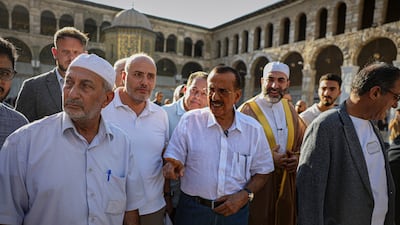Welcome to The National's weekly newsletter Beshara, where we share the most positive stories of the week.

Turning the tide, an idiom rooted in nautical language, describes a shift in circumstances that transforms adversity into opportunity. Like the ocean’s changing currents, it signals a turning point, one that usually steers us to calmer seas.
History, we hope, will look back on today as the moment the tide began to turn for Palestinian civilians trapped in Israel’s war on Gaza.
As our foreign editor, Mohamad Ali Harisi, writes: “For Palestinians, today is both painful and historic. They continue to suffer devastation in Gaza and the occupied West Bank. Yet from the rubble has come new momentum. Recognition by more western states at the UN shows that Palestinian statehood is being treated not just as a demand but as a fact”.
Today, the world’s eyes are on the UN General Assembly – perhaps more so than at any point in its 80-year history – as heads of state attempt to chart a course towards a two-state solution.
Syria’s representation at the UNGA for the first time in almost 60 years will not go unnoticed – and perhaps there will be parallels and hope to draw from its return to the world stage and the relief it could bring for Syrians still living under UN sanctions.
May you always have hope on the horizon,
Nicola Leech
Head of Audience
Changing times for Palestine

Earlier this year, France became among the first major western nations to announce its intention to recognise Palestinian statehood. Alongside Saudi Arabia, it led the New York Declaration, which outlined “tangible, timebound, and irreversible steps” towards a two-state solution.
On Sunday, Canada became the first G7 nation to formally recognise Palestine, followed by Australia, the UK, and Portugal. Today, France, along with Belgium, Malta, Luxembourg, San Marino, and Andorra, will make the same declaration.
Canadian Prime Minister Mark Carney said his country “offers our partnership in building the promise of a peaceful future for both the State of Palestine and the State of Israel”.
Australia’s Prime Minister Anthony Albanese said the move reflects a “long-standing commitment to a two-state solution, which has always been the only path to enduring peace and security for the Israeli and Palestinian peoples”.
UK Prime Minister Keir Starmer said the decision would “revive the hope of peace and a two-state solution,” adding that “ordinary people, Israeli and Palestinian, deserve to live in peace”.
Husam Zomlot, head of the Palestinian mission to London, will now officially become ambassador to the UK. Today, he will raise the Palestinian flag outside what is now the embassy.
“The wrongs of the past are beginning to be corrected,” he said.
Don’t miss a moment of the UNGA80 – our correspondents and editors in New York will be sharing live updates here, and you can find all our analysis, special reports and commentary on the Assembly here.
Watch a replay of our live Q&A with The National's editors, correspondents and analysts on the push for a two-state solution and its potential impact on the ground.
Quoted
'UNGA will offer Syria its first positive international spotlight in decades. It is a stage for political theatre, with world leaders as its audience. Speeches rarely shift policy overnight, but in the UN chamber, words matter. They set expectations, signal intent, and help shape global perceptions'
– Dr Haid Haid is a senior non-resident fellow at the Arab Reform Initiative and a consulting research fellow at Chatham House’s Middle East and North Africa Programme. Read his op-ed here.
Man-made reef turns the tide
And now to changing tides, literally in the ocean.
Newly released footage from the Dubai Reef, one of the world’s largest man-made reef projects, shows schools of native fish circling concrete modules – the first tangible signs of recovery in the emirate's marine habitat.
Launched in 2023, the fish biomass has increased eight-fold and marine biodiversity has risen by 10 per cent, the team says, with groupers, snappers and barracuda now thriving around the man-made structures.
While artificial reefs are not a new idea, few have been attempted on this scale.
So far, 39 per cent of the planned concrete structures have been completed, with 3,600 deployed in Dubai waters. A further 20,000 are expected by the end of 2027.
Read more from our climate editor, Rachel Kelly, and see a video of the project and its marine life here.
Snapshot

See Beshara photos of the week here
Impact on Instagram
Highlights
The National produces a variety of newsletters across an array of subjects. You can sign up here. To receive The Editor's Briefing, our Editor-in-Chief's weekly newsletter – exclusive to registered readers – that rounds up the top stories of the week, sign up here.





